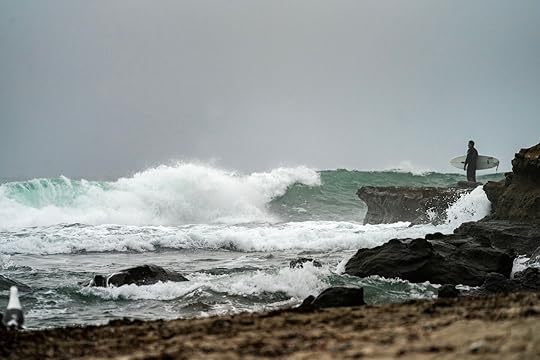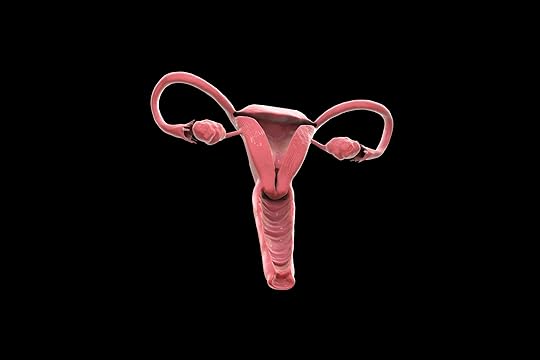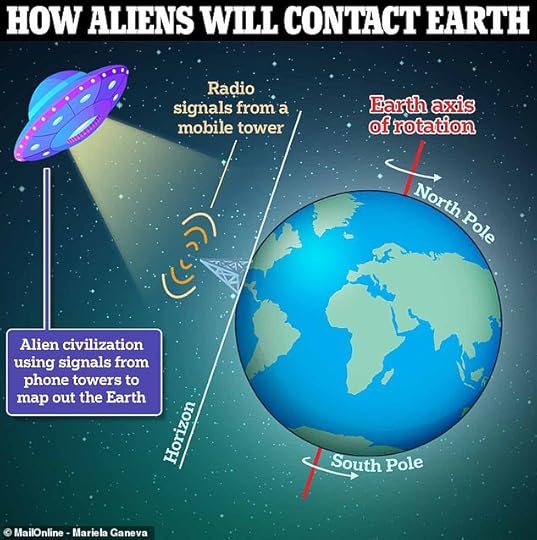James Frey's Blog, page 33
May 11, 2023
Mavericks Drowning
 On a foggy day on Mavericks Beach, surfers look out over the waves. (Melina Mara/The Washington Post)
On a foggy day on Mavericks Beach, surfers look out over the waves. (Melina Mara/The Washington Post)HALF MOON BAY, Calif. — The wave roars like a dozen cannons as it climbs four stories high, casting the few bold enough to surf its crest into a teeming pit of frigid, shark-filled ocean. It costs nothing to paddle the half-mile from Pillar Point through surging sea and up a liquid mountain that has slain two of the most gifted men to ride a surfboard. Daring death has no price tag, even if people keep trying to find one.
May 10, 2023
Juan de Fuc’d
The Coast Guard is the first line of defense against a massive tsunami. Will it also be an early victim?
By ERIC SCIGLIANO
 An evacuation sign points to the way to safety for those on the mainland on the Olympic Peninsula.
An evacuation sign points to the way to safety for those on the mainland on the Olympic Peninsula.On the north shore of Washington’s wild Olympic Peninsula, a scimitar-shaped sandspit called Ediz Hook arcs for three miles into the Strait of Juan de Fuca. At its tip, between snowy mountains to the south and Vancouver Island to the north, sits what may be the nation’s most scenically sited military installation — and its most vulnerable.
U.S. Coast Guard Air Station Port Angeles is the very first of first responders when something goes wrong, as it often does, on the state’s tangled straits and inlets and stormy outer coast and, sometimes, on the peaks and bluffs overlooking them. The station’s three MH-65 Dolphin helicopters are the only aircraft the Coast Guard, America’s frontline coastal defense and search-and-rescue service, bases along Washington’s deeply crenulated 3,026-mile coastline. In 2021, they undertook 195 search-and-rescue missions. Ediz Hook is also home base for four seagoing cutters, 87 to 110 feet long, and one 210-foot medium-endurance cutter, which are often away patrolling for drug smuggling, human trafficking, illegal fishing, oil spills and other security and environmental threats. Two 29-foot and two 45-foot short-range response boats deal with local emergencies; they joined the choppers on 16 rescue missions in 2021 and responded on their own in 23 others.
But those exploits are just a warm-up for the disaster to come. Someday — next week, next year, maybe next century — a sudden and deadly marine shock will strike the Northwest coast: what locals call the Big One, a circa 9.0-magnitude offshore earthquake generating tsunami surges reaching 60 feet high or more. Preparations for this threat have especially lagged in Washington, says state seismologist Harold Tobin, who chairs the University of Washington’s seismology and geohazards program and the Pacific Northwest Seismic Network: “Oregon, California and British Columbia have all taken it more seriously.”
May 9, 2023
MTV News Gone
BY MEG JAMES

(MTV )
Perhaps it’s fitting that MTV News, a youth brand if there ever was one, never hit the big 4-0.
On Tuesday, Paramount Global pulled the plug on MTV News, a cable television staple from the late 1980s through the early aughts, and was particularly well-known — especially to Gen-Xers and older millennials — for chronicling the heady music culture of the ’90s.
The influential and crowd-pleasing telecast brought pop music culture, news and politics to young audiences, long before the internet and Napster changed the industries of media and music in fundamental ways.
May 8, 2023
Tolstoy 2023
By John Tamny

For mountain climbers, one imagines that Mt. Everest looms as the ultimate climb to validate one’s ability. For runners, it would be the Boston Marathon, for triathletes the Iron Man?
For readers, it’s no reach to say that Leo Tolstoy’s War and Peace is the Mt. Everest, Boston Marathon, or Iron Man of reading. Coming in at 1358 pages comprised of tiny letters, just looking at the novel is to feel intimidated. Picking it up in no way reduces the internal discomfort. No one likes to give up (see deaths on Everest, etc.), but it’s safe to say that more people have quit reading War and Peace than have completed it, after which it’s even safer to say that exponentially more people have purchased War and Peace than have ever begun reading it. It’s easier on one’s psyche to not open the book at all than to open it only to close it for good after just a few pages. Better to not have ventured than to have ventured only to quit, or something like that. At least it gives you deniability.
May 7, 2023
SETI 2023
The most potent effort yet to find extraterrestrial life is searching for beings that may not want to be found
By Seth Shostak

What could motivate extraterrestrial civilizations to beam electromagnetic signals into space? They might be using them for navigation or entertainment, or as a way of pinging our solar system to see if anyone’s home. Whatever the case, detecting such transmissions would be the easiest way for humankind to prove that someone else is out there, and astronomers have made intermittent attempts to eavesdrop on alien broadcasts for six decades.
These initiatives are collectively known as SETI, the Search for Extraterrestrial Intelligence. Its history dates back to 1960, when astronomer Frank Drake aimed an 85-foot antenna at two relatively close star systems, hoping to pick up an alien signal. It was a simple, two-week experiment using already-existing equipment. Although Drake failed to discover any transmissions, his work excited the public and spawned further attempts.
Early this year, the SETI Institute (where I work) and the University of California, Berkeley, launched COSMIC, a new project that is about a thousand times more comprehensive than Drake’s pioneering effort. It will search for alien signals—both intentional and unintentional—from some 40 million star systems by analyzing massive amounts of data from the Very Large Array, an ensemble of 27 antennas dotting the scrub deserts of western New Mexico. The researchers have also deployed cameras designed to look for powerful flashing lasers that could be used by extraterrestrials to beam information between star systems, much like a ship semaphore.
May 5, 2023
Forever Follicles

ILLUSTRATION: KATERYNA KON/GETTY IMAGES
THE OVARY IS a time machine. It travels to the future, reaching old age ahead of the rest of the body. At birth, each ovary contains around a million follicles—tiny, fluid-filled sacs that hold immature eggs. But the decline of these follicles is immediate and unceasing. By puberty, only about 300,000 remain. By age 40, the vast majority are gone. And by 51, the average age of menopause in the United States, virtually none are left.
Humans are an oddity in this regard. Most mammals remain fertile up to the end of their lives; the only species known to experience menopause naturally are humans and some whales. In humans, the loss of hormones during menopause sets off a cascade of negative health effects: Bones get brittle; metabolism slows; and the risk of cardiovascular disease, diabetes, stroke, and dementia increases. Paradoxically, women live longer than men on average but spend more of their older years in poor health.
Final Thoughts
The researchers advised against making firm conclusions due to the limited sample size and the fact that the patients did not survive.
Edited by Nikhil Pandey

Research finds intriguing brain wave patterns in comatose patients.
For a very long time, mysteries surrounding death and experiences during and after a person’s death have challenged the minds of humans. The consequences of death on the human body and psyche have been the subject of numerous studies and trials.
Now a modest study has produced preliminary evidence of increased brain activity throughout the process of dying, which may be connected to consciousness.
Researchers from the University of Michigan in the US have discovered that two people’s brains experienced an increase in activity as they approached death. This phenomenon is similar to spikes in brain activity that have previously been observed in animals whose hearts had stopped beating.
May 4, 2023
Phreaking Aliens
By SAM TONKIN

Mobile towers emit most of their radio power parallel to the surface of the Earth, meaning a signal is strongest when it is rising or setting across the horizon, as seen from a prospective alien world
If there are aliens out there, it might not be that hard for them to find us.
That’s because experts say extraterrestrial civilisations could map our planet using signals from mobile phone masts – the number of which have grown exponentially over the past 30 years.
They are now the second most powerful source of Earth’s radio leakage – behind only military radar transmissions – having overtaken the commercial radio and television station powerhouses of the 20th century.
To put this into context, each mobile tower emits a radio signal with a power of 100-200 watts, equating to a peak total leakage of four gigawatts from our planet, according to researchers at the University of Mauritius and University of Manchester.
It means that if aliens had a radio telescope equivalent to the £1.7 billion Square Kilometre Array (SKA) being built across South Africa and Australia and due to be finished by 2028, then they should just about be able to detect our 4G activity.
May 3, 2023
Amsterdam Notes
Stedelijk Museum’s director calls it a ‘contemporary Bayeux tapestry.’
[image error]Keith Haring drawing Amsterdam Notes in the Stedelijk Museum Amsterdam, 1986. Photo: Rob Bogaerts. National Archives of the Netherlands / Anefo. Amsterdam Notes copyright © Keith Haring Foundation
By 1986, Keith Haring was at the peak of his powers. But when tasked with creating an exhibition for Amsterdam’s Stedelijk Museum, Haring refused to remount old works, or even to lean on the celebrated visual motifs—the barking dogs, the glowing babies—with which his name had become synonymous. The New York artist wanted to create something completely new.
One of the results was Amsterdam Notes, a 125-foot black ink drawing that stands as one of the largest pieces Haring made for a museum. Nearly three decades on, Stedelijk is restaging the giant paperwork in its IMC Gallery, its so-called hall of honor, alongside two other works from the museum’s collection from May 26.
“For art lovers, Amsterdam Notes is a contemporary Bayeux tapestry, and a holy grail for Haring fans. Since works on paper are fragile, they cannot be exhibited for long,” the museum’s director Rein Wolfs said. “Moments such as this are unique, and happen rarely. But, this summer, the door to the Stedelijk’s treasury is ajar.”
May 2, 2023
TV Blues
On the cusp of a potential strike, writers explain why no one is having much fun making television anymore.

For people outside the industry, the woes of TV writers can elicit a boo-hoo response. But the economics of streaming have chipped away at what was previously a route to a middle-class life. Photograph by David McNew / Getty
Possibly the most famous telegram in Hollywood history was sent in 1925, when Herman J. Mankiewicz, the future co-writer of “Citizen Kane,” urged his newsman friend Ben Hecht to move West and collect three hundred dollars a week from Paramount. “The three hundred is peanuts,” Mankiewicz assured him. “Millions are to be grabbed out here and your only competition is idiots.” The rise of the talkies, for which Hecht became a prolific scenarist, soon brought a wave of non-idiot writers to Los Angeles, to supply the snappy movie dialogue of the thirties—a decade that, not incidentally, saw the rise of the Screen Writers Guild.
Writers have always endured indignities in Hollywood. But, as long as there are millions to be grabbed, the trade-off has been bearable—except when it isn’t. The past month has brought the discontent of television writers to a boiling point. In mid-April, the Writers Guild of America (the modern successor to the Screen Writers Guild) voted to authorize a strike, with a decisive 97.85 per cent in favor. The guild’s current contract with the Alliance of Motion Picture and Television Producers expires on May 1st; if the negotiations break down, it will be the W.G.A.’s first strike since late 2007 and early 2008. At issue are minimum fees, royalties, staffing requirements, and even the use of artificial intelligence in script production—but the over-all stakes, from the perspective of TV writers, feel seismic. “This is an existential fight for the future of the business of writing,” Laura Jacqmin, whose credits include Epix’s “Get Shorty” and Peacock’s “Joe vs. Carole,” told me; like the other writers I spoke to, she had voted for the strike authorization. “If we do not dig in now, there will be nothing to fight for in three years.” TV writers seem, on the whole, miserable. “The word I would use,” Jacqmin said, “is ‘desperation.’ ”
James Frey's Blog
- James Frey's profile
- 3309 followers



